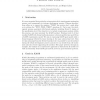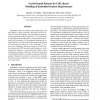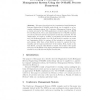RE
2010
Springer
14 years 8 months ago
2010
Springer
Self-adaptation is imposing as a key characteristic of many modern software systems to tackle their complexity and cope with the many environments in which they can operate. Self-a...
RE
2008
Springer
15 years 1 months ago
2008
Springer
Representation and reasoning about goals of an information system unavoidably involve the transformation of unclear stakeholder requirements into an instance of a goal model. If t...
122
click to vote
ASM
2008
ASM
15 years 4 months ago
2008
ASM
anguage (Event B), hence staying at the same abstraction level. Thus we take advantage from the Event B method: (i) it is possible to use the method during the whole development pr...
122
click to vote
HASE
2007
IEEE
15 years 6 months ago
2007
IEEE
Embedded systems are used for critical applications that must adhere to safety constraints. Developers of these systems face three key challenges when attempting to apply existing...
125
click to vote
AOSE
2007
Springer
15 years 6 months ago
2007
Springer
Abstract. Nowadays, information systems have to perform in complex, heterogeneous environments, considering a variety of system users with different needs and preferences. Software...
134
click to vote
IAT
2006
IEEE
15 years 8 months ago
2006
IEEE
The representation of goals and the ability to reason about them play an important role in goal-oriented requirements analysis and modelling techniques, especially in agent-orient...
ER
2007
Springer
15 years 8 months ago
2007
Springer
Representation and reasoning about information system (IS) requirements is facilitated with the use of goal models to describe the desired and undesired IS behaviors. One difficul...
101
click to vote
AOSE
2007
Springer
15 years 8 months ago
2007
Springer
This paper describes how the Organization-based Multiagent Systems Engineering (O-MaSE) methodology can be applied to an exemplar multiagent system, the Conference Management Syste...
125
click to vote
CAISE
2009
Springer
15 years 8 months ago
2009
Springer
Self-contextualizability refers to the system ability to autonomously adapt its behaviour to context in order to maintain its objectives satisfied. In this paper, we propose a mod...



